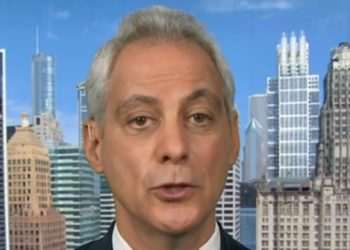Meta said on Wednesday that it expected to see strong revenue growth in its advertising business in the coming months, even as President Trump’s tariffs threaten to batter the global economy.
The Silicon Valley company, which owns Facebook, Instagram and WhatsApp, also reported rising revenue and profit for the first quarter, buoyed by Instagram and Facebook ads. But it added that it would monitor the “active regulatory landscape,” which includes legal challenges in the European Union and the United States that could “significantly impact” its core business.
Revenue for the first quarter was $42.3 billion, up 16 percent from a year earlier and above Wall Street estimates of $41.3 billion, according to data compiled by FactSet, a market analysis firm. Profit was $16.6 billion, up 35 percent from $12.4 billion a year earlier and surpassing estimates of $13.6 billion.
For the current quarter, Meta said it expects revenue of $42.5 billion to $45.5 billion, with the high end of that range above Wall Street expectations of $43.8 billion. The company’s shares rose more than 5 percent in after-hours trading.
“We’ve had a strong start to an important year, our community continues to grow and our business is performing very well,” said Mark Zuckerberg, the chief executive of Meta.
Meta’s business has been robust in recent years as the company has invested in artificial intelligence to suggest different posts, videos and ads to users. Mr. Zuckerberg has said the investments have kept people coming back to Meta’s apps more regularly and clicking more relevant ads.
But the company faces new challenges in the Trump era. President Trump’s tariffs may affect some of Meta’s largest initiatives, including spending billions on infrastructure projects like data centers, which use raw materials that have been hammered by Mr. Trump’s import taxes.
Meta expects to spend even more on those infrastructure investments. On Wednesday, it raised its capital expenditure forecast for this year to $64 billion to $72 billion, up from $60 billion to $65 billion.
Meta has faced questions about its main revenue source: selling digital ads to brands and retailers, both large and small. The more that small businesses are hit with tariffs, the less they can afford to spend on Facebook and Instagram ads.
Mr. Trump set the highest tariffs on imports from China, and Chinese e-commerce powerhouses like Shein and Temu are especially important to Meta’s business. In 2023, Chinese companies accounted for 10 percent of Meta’s revenue.
Meta is also undergoing an antitrust trial in Washington over whether it illegally quashed competition in social networking by buying Instagram and WhatsApp when they were young start-ups. The outcome of the multiweek trial, which is the first major tech case prosecuted by the current Trump administration, could reshape the U.S. antitrust landscape and the Silicon Valley ecosystem.
Last week, the European Union said it was fining Meta 200 million euros ($230 million) for breaking the Digital Markets Act, a 2022 law intended to increase competition in the digital economy.
Wednesday’s earnings did not show an advertising pullback, as Mr. Trump’s tariffs were announced in April and the earnings period ended in March. The company’s financial guidance suggested that brands might continue spending on advertising on Facebook and Instagram, which have billions of users worldwide.
Instead, advertisers may cut ad spending on smaller platforms like Reddit, Snapchat and Pinterest, said Minda Smiley, a senior social media analyst at eMarketer. The impact won’t be seen until future earnings, she added.
“It’s sort of business as usual” right now, Ms. Smiley said. “But there’s uncertainty in terms of how they’re going to be impacted in the next quarter.”
Mike Isaac is a technology correspondent for The Times based in San Francisco. He regularly covers Facebook and Silicon Valley.
Eli Tan covers the technology industry for The Times from San Francisco.
The post Meta Says It Anticipates Continued Growth Despite Tariffs appeared first on New York Times.




